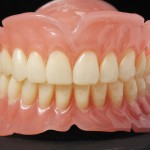
Good denture hygiene is important as dentures can act as a reservoir for micro-organisms which can be sources of potential local and systemic infections, with denture stomatitis being commonly found in complete denture wearers. A number of denture disinfection protocols have been tested including microwave disinfection protocols where dentures are immersed in water or not and subjected to variable amounts of microwave irradiation.
The aim of this review was to assess the effect of microwave disinfection on the dimensional stability of denture base acrylic resins and to provide evidence of a safe microwave protocol for disinfecting dentures.
Methods
A protocol for the review was registered in the PROSPERO database. Searched were conducted in the Medline/PubMed, Embase and Scopus databases. English language clinical and in-vitro studies assessing the effect of microwave disinfection protocols on the dimensional stability of denture base acrylic resins were considered. Two reviewers independently selected studies and extracted data. Quality was independently assessed by two reviewers using the Johanna Briggs Institute (JBI) Critical Appraisal Checklist for Quasi-Experimental Studies (non-randomised experimental studies), adapted for in-vitro studies. A qualitative summary was presented owing to significant study heterogeneity.
Results
- 7 in-vitro studies presenting positive and negative controls were included.
- 5 studies assessed linear stability, 2 tridimentional stability.
- Control agents included sodium hypochlorite solution, diluted sodium hypochlorite solution, gluconate chlorhexidine, effervescent tablets, immersion in tap water, distilled water, active chlorine solution, and glutaraldehyde.
- Microwave protocols varied with power settings between 450 – 900W and timings between 3-15 minutes.
- 6 studies used denture bases as specimens, one study used rectangular specimens.
- In general, microwave disinfection produced more distortion on the materials than do immersion in sodium hypochlorite, chloride solution, chlorhexidine, and water immersion.
- Considering the dimensional stability of the specimens, microwave disinfection at 500 W for 3 minutes, and at 450 W for 5 minutes, produced similar or better outcomes than did control groups.
Conclusions
The authors concluded: –
…microwave disinfection produced significant changes in the tridimensional and linear stability of denture base acrylic resins in general. Only two microwave disinfection protocols were considered safe for disinfecting complete dentures, and the findings were comparable to those of chemical disinfection protocols, including immersion in 5.25% NaOCl, 125 ppm NaOCl, 0.12% gluconate chlorhexidine, effervescent tablets, and 2% glutaraldehyde.
Comments
We have previously looked at reviews of microwave disinfection for the management of denture stomatitis (Dental Elf – 13th Nov 2020; Dental Elf – 20th Nov 2017). Those reviews have included small numbers of randomised controlled clinical trials and suggested that microwave disinfection is effective for the treatment of denture stomatitis. This new review only includes English language studies so may have excluded some relevant studies. It also only includes in-vitro studies using acrylic specimens rather than dentures which have complex shapes with variations in thickness. So, while we can garner interesting information from these studies there may not be a direct read across to the clinical situation. A wide range of microwave disinfection protocols were used in the included studies and the reviewers specify two potential protocols that may be safe. However, because of the heterogeneity of protocols and the small number of studies included these finding should be considered cautiously. Further studies are needed to assess the impact of microwave disinfection of the dimensional stability of dentures in the short and medium term.
Links
Primary Paper
da Costa RMB, Venante HS, Pordeus MD, Chappuis-Chocano AP, Neppelenbroek KH, Santiago Júnior JF, Porto VC. Does microwave disinfection affect the dimensional stability of denture base acrylic resins? A systematic review. Gerodontology. 2021 Oct 18. doi: 10.1111/ger.12597. Epub ahead of print. PMID: 34661315.
Other references
Dental Elf – 13th Nov 2020
Dental Elf – 20th Nov 2017
